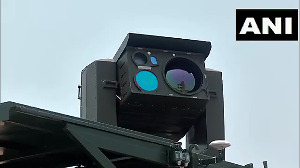'Some part could be used for consumption purposes, and the rest could be used to meet important financial goals.'
'The split can be 30:70 to 50:50, depending on one's situation.'

The Union Budget's revised tax slabs and rates will put more money in taxpayers' hands.
For those earning Rs 12 lakh annually and filing tax under the new regime, for instance, they translate to an additional Rs 83,000 per year.
Individuals with incomes of Rs 25 lakh will have Rs 1.1 lakh more annually.
Risk of splurging
Those already in the new tax regime will have more money in their hands than last year.
"The risk is that the entire additional sum could go into spending," says Arvind Rao, founder of Arvind Rao & Associates.
Those who migrate from the old to the new regime will not need to invest any more in tax-saving instruments.
These have historically promoted long term savings while providing deductions under sections like 80C.
"Instruments like Public Provident Fund (PPF), National Savings Certificate (NSC), and Equity-Linked Savings Scheme (ELSS) encouraged individuals to save for long-term goals while reducing their tax liability," says Sapna Narang, managing partner, Capital League.
Rao warns that ignoring long-term investments just because there is no tax deduction attached to them could have negative long-term consequences for taxpayers' finances.
Adopt a structured approach
Experts recommend a balanced strategy for deploying the additional money.
"Some part could be used for consumption purposes, and the rest could be used to meet important financial goals. The split can be 30:70 to 50:50, depending on one's situation," says Rao.
Reduce debt: In recent times, the burden of unsecured loans on households has been rising.
"Taxpayers should use the extra money to reduce their exposure to high-cost credit card debt and personal loans," says Abhishek Kumar, a Securities and Exchange Board of India-registered investment adviser and founder of SahajMoney.com.
Prepaying home loans is another prudent option.
"Besides reducing the loan tenor, prepayment will help reduce the total interest outgo," says Adhil Shetty, CEO, BankBazaar.

Prioritise long-term goals: Financial advisors underline the importance of allocating additional income towards long-term goals such as one's retirement and children's education.
"If you put in more money towards these goals from an early age, the power of compounding will ensure you have to contribute less to meet these goals, or you will achieve them faster," says Rao.
Renu Maheshwari, Sebi-registered investment adviser at Finscholarz, suggests investing largely in equity-oriented instruments for long-term wealth building.
Some taxsavers remain relevant
A few instruments, which offer tax deduction, remain relevant even for taxpayers in the new regime.
"Despite not availing tax benefits, one should continue investing in Public Provident Fund (PPF) for its low-risk, long-term savings features and tax-free returns. The 'tax-free' return is a very big incentive making it more attractive vis-a-vis most debt investments," says Narang.
She also recommends investing in the National Pension System (NPS).
Experts also recommend Employees' Provident Fund (EPF) for long-term savings.
"Employees should not reduce or withdraw from their EPF contributions, as the compounding effect over decades creates substantial wealth," says Maheshwari.
She adds that life and health insurance must be purchased for financial protection rather than tax benefits.
Similarly, home and education loans remain relevant need-based tools, even without deductions.
Taxpayers in the new regime may avoid ELSS and instead favour equity mutual funds which do not have a lock-in period.
Disclaimer: This article is meant for information purposes only. This article and information do not constitute a distribution, an endorsement, an investment advice, an offer to buy or sell or the solicitation of an offer to buy or sell any securities/schemes or any other financial products/investment products mentioned in this article to influence the opinion or behaviour of the investors/recipients.
Any use of the information/any investment and investment related decisions of the investors/recipients are at their sole discretion and risk. Any advice herein is made on a general basis and does not take into account the specific investment objectives of the specific person or group of persons. Opinions expressed herein are subject to change without notice.
Feature Presentation: Ashish Narsale/Rediff.com












 © 2025
© 2025